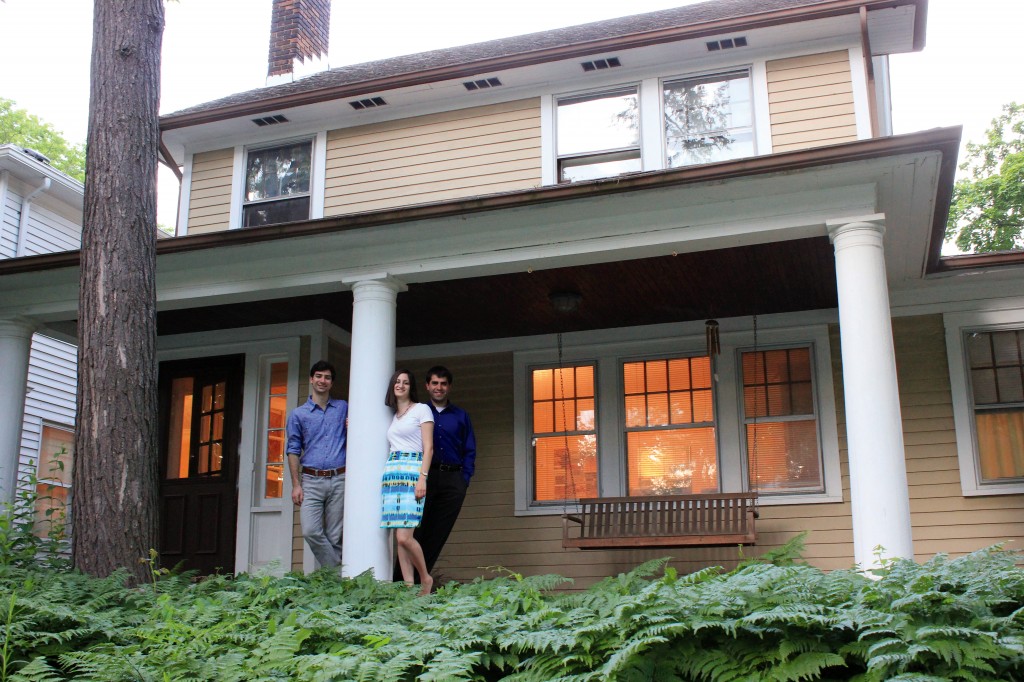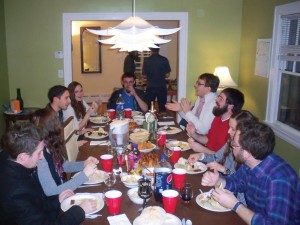Led by three 20-somethings, Moishe House is helping young Jewish Clevelanders forge bonds, find their place

From left, residents Ben Sattin, Mandy DuBro and Josh Kramer stand on the front porch of Moishe House in Cleveland Heights.
Story and photography by Michael C. Butz
On a dusky spring night in June, there’s constant motion inside Moishe House. Ben cleans up after returning home from a softball game before logging onto his computer, Mandy pours herself a glass of water as she starts to pack for a trip to Israel she’ll embark on days later, and after a long day at work, Josh sits down for a late dinner consisting of a sandwich, chips and hummus.
And yet for these 20-somethings, this is a relatively relaxed evening.
Other nights, they’re hosting 20 to 30 people for Shabbat dinners at their namesake Cleveland Heights house, planning poker nights or other social activities the proceeds of which will benefit Jewish charities, or partnering with area synagogues or Jewish institutions for programs that build ties and strengthen bonds in the community.
Of course between all of that, there’s still time for impromptu games of foosball – with house bragging rights on the line– and the exchange of lighthearted jabs at one another.
“She’s the boss,” Josh says, rather businesslike, about Mandy. “We’ve had a running joke since Day 1 that Mandy is the ‘CEO of Moishe House.’”
With her breezy smile, she counters, “It’s because they both moved out of their mothers’ homes. Now, they’re both essentially trained.”
“Whatever she says, goes,” Josh concedes.
It’s that familiar, comfortable, sharp-yet-cozy family dynamic that’s at the core of Moishe House Cleveland’s early success. But this family is a different type of family – one providing millennials a sense of place and purpose in the Jewish community at a time in their lives when structure is often lacking and they’re susceptible to straying away.
Migrating to ‘The Moish’
Ben Sattin, 27, and Mandy DuBro and Josh Kramer, both 26, moved into Moishe House – a recently renovated 1924 Colonial on Idlewood Road affectionately nicknamed “The Moish” – in September 2013.
It’s a three-story, four-bedroom affair with hardwood floors, a working fireplace and plenty of open space to move around chairs, couches and tables to accommodate large gatherings. That said, one room tends to be more popular than others.
“Everyone congregates in the kitchen,” says DuBro, laughing, acknowledging that sometimes hampers her ability to prepare and serve meals for guests. “But it’s where the food is, so I guess that’s where I’d be if I was coming over.”
“Moishe House” doormats welcome visitors at the front porch and back deck, and Judaica – mezuzah, kiddush cups, Shabbat candles – and Cleveland-centric decorations help give the residence an identity.
But it’s the residents who are Moishe House’s most interesting feature.
Sattin and Kramer are native Northeast Ohioans. Sattin, an attorney, was born and raised in Cleveland Heights, his family members of Congregation Shaarey Tikvah. He earned an economics degree from Washington University in St. Louis before returning to Cleveland to earn a law degree from Case Western Reserve University. Between stints in higher education, he spent nine months volunteering in the Jewish community in Berlin.
“When I was in law school, I was removed from the community by choice (due to studying),” Sattins says. “(Otherwise) I’d been active in a Jewish community in one way or another.”
Kramer grew up in Shaker Heights and is a fifth-generation member of Park Synagogue. Now a government-relations consultant, he graduated from The Ohio State University with a degree in political science and international affairs (and minored in Yiddish). When he lost his first post-grad state government job due to a political regime change, he landed a job with Army Continuing Education Services that sent him to Kandahar Airfield in Afghanistan for seven months.
“I blogged about my Jewish experiences while there,” he says, “and the Jewish experiences were some of the most interesting.”
DuBro grew up in Dayton and graduated from Miami University in Oxford before moving to Cleveland to earn her master’s degree in social work from CWRU. She now works as an in-home child and family therapist. With no nearby family of her own, she felt she was fortunate to move in with a roommate who was already plugged into the community here.
“I met so many people through her,” DuBro says. I’ve never had so many Jewish friends – just because wherever I lived, there weren’t that many Jews.”
Sattin, Kramer and DuBro all were involved in Jewish life as teenagers and college students, and because that involvement carried over as young adults in Cleveland’s Jewish community, they became familiar – and friendly – with one another by way of attending a lot of the same events.
When word spread that a Moishe House would be opened in Cleveland, the three applied to live there. Sattin and Kramer threw their hats in the ring first, along with a mutual friend who encouraged them to do so. When that friend dropped out of the process, DuBro stepped in. After a vetting process that spanned several months, the three were chosen to lead.
Open-door policy
Since moving in, they’ve organized 60 events and entertained 959 guests – 302 of whom have been first-time guests. They’re averaging 17 attendees per program, and their largest single-event draw was 60 people.
They’ve also partnered with other groups 39 percent of the time – a figure that signifies more collaboration than at most other houses, says Jason Boschan, Moishe House’s director of marketing and communications at the international level. There are 64 houses across 14 countries worldwide.
“They’re doing great,” Boschan says of Cleveland. “From what I can tell from the programs I’ve seen and the results coming through from their efforts, they have a pretty solid dynamic working there in a short amount of time.”
Erika Rudin-Luria, community development vice president for the Jewish Federation of Cleveland, which is a partner and local funder of Moishe House, says Sattin, DuBro and Kramer have done a “tremendous job of engaging their peers as well as partnering with Jewish institutions.”
“There’s a great want for involvement and activity among young people in Cleveland, and Moishe House has tapped into that,” she says, adding that Federation’s backing stems from its desire to provide as many avenues as possible for engagement in the Jewish community.
“We recognize that different aspects of Jewish life are interesting to people at different points in their lives, and that different things appeal to different people,” she says, explaining that young people who aren’t yet married and don’t have kids are less likely to join membership institutions like synagogues. “We’re always looking for new ways to attract people to Jewish life.”
Comfort zone
In the demographic himself, Kramer acknowledges the potential gap in structured Jewish involvement between childhood and starting a family.
“It’s a bell curve from bar mitzvah to having kids. (Structured involvement) drops and comes back up,” he says. “It’s probably even more pronounced after college. Colleges have Hillel and Chabad, and they’re catering to you. After that, there’s nothing – unless you’re lucky enough to live in a place like Cleveland.”
 Federation’s Young Leadership Division and Cleveland Hillel’s JCLE help bridge that gap, as do synagogue-affiliated young professionals groups. Moishe House does the same by emphasizing peer-to-peer connections in a home-based community with programming that falls into one of four categories: Jewish culture and holidays, Jewish learning, social, and community-based service. While Moishe House partners with other Jewish organizations, it’s ultimately free of institutional ties or hierarchy that might intimidate or alienate some 20-somethings.
Federation’s Young Leadership Division and Cleveland Hillel’s JCLE help bridge that gap, as do synagogue-affiliated young professionals groups. Moishe House does the same by emphasizing peer-to-peer connections in a home-based community with programming that falls into one of four categories: Jewish culture and holidays, Jewish learning, social, and community-based service. While Moishe House partners with other Jewish organizations, it’s ultimately free of institutional ties or hierarchy that might intimidate or alienate some 20-somethings.
“The whole idea of taking a synagogue and becoming a member is a decision a lot of my peers aren’t ready to make right now,” Sattin says.
And Moishe House gives those peers a home.
“It’s important to me that our programs and the atmosphere of the house be very inclusive,” DuBro says. “While our personalities come through in our programming, people can feel comfortable attending regardless of background – and you can see that in the house. There are Jewish themes, but they’re not overwhelming. Whatever background you have, you should be able to feel at home here.”
But it’s those personalities DuBro mentions – the chemistry among the three of them – that really gives Moishe House its inviting, homelike environment and its guests a sense of belonging.
“We’re all very different, interests-wise, and the way we function in life is completely different,” she says, “but together, it’s a really good match.”

